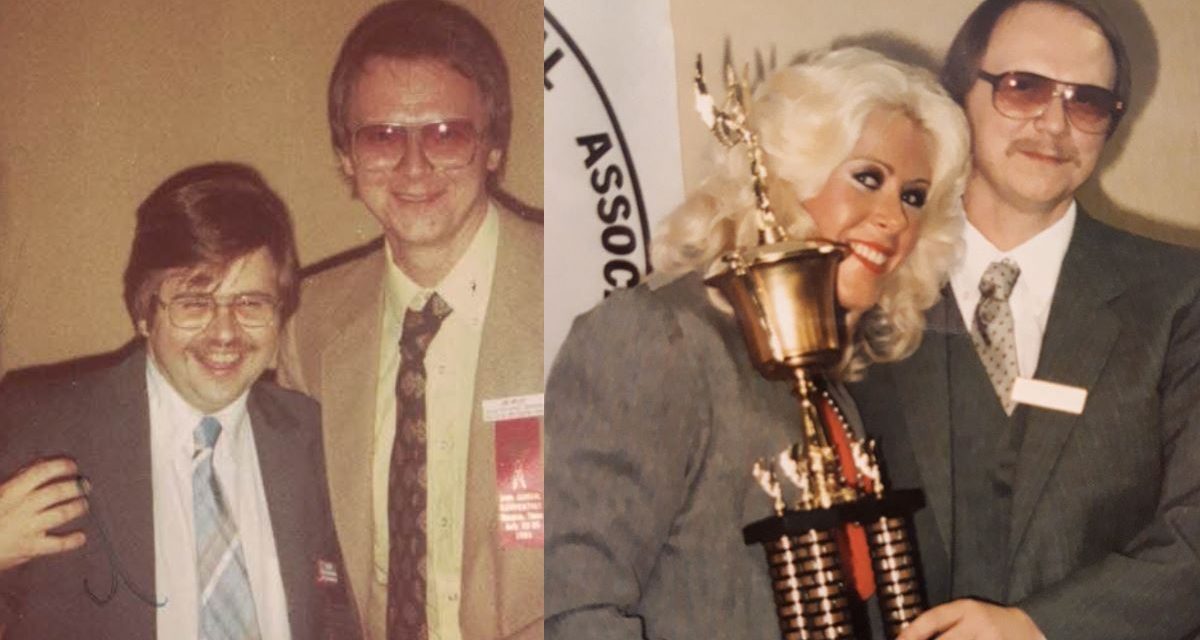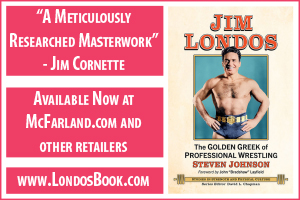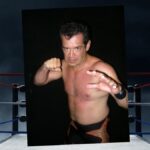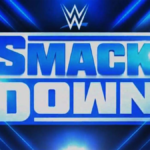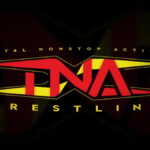At a workplace Christmas function, nine years ago, a co-worker familiar with my love of pro wrestling told me, “Hey, I should introduce you to Jim Melby. He likes pro wrestling.” Melby, Melby, why does that name seem familiar? I wondered. Then I met him and I knew who he was!
“Are you THE Jim Melby, editor of The Wrestling News, and author of the ‘As I See It’ column?” I asked the bespectacled gentleman, who was eyeing me over his beer.
“That’s me,” he said warily.
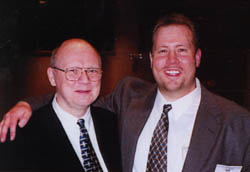
Jim Melby (left) and Bill Fernow at the Cauliflower Alley Club reunion in Las Vegas in 2002. Photo by Rose Diamond
“I’m a really big wrestling fan,” I told him, pumping his hand, as I began to pepper him with questions about all of my favorite wrestlers I had watched in the AWA as a kid. Rather than heading for the hills, Jim Melby smiled in the bemused way that he always did, and patiently answered my queries.
And so, my friendship with Jim began, with me marking out over the excitement of meeting this legend of pro wrestling journalism after discovering that we worked for the same department.
But really, it felt as if I had known him for years.
As a boy, I was an avid reader of the wrestling magazines he produced with friend and business partner Norman Kietzer, and remembered seeing his face printed in the magazine. Once, on the back cover, Jim appeared in a photo with the hated Sheikh Adnan Alkaissy. I was impressed. This guy wasn’t just the editor of the magazine; he hobnobbed with good and bad guys alike!
Our friendship grew, and Jim introduced me to The Golden Age of Pro Wrestling, and the wrestlers who made it happen. Hard Boiled Haggerty, Bronko Nagurski, Hans Schmidt, and Jim’s personal hero, Verne Gagne, are just a few that we’d talk about and watched footage of. I spent a lot of Saturday afternoons hanging out with Jim, talking wrestling, watching tapes of matches, and drinking beer. Jim, who’d also worked for Verne Gagne and Wally Karbo, would pass along stories Wally had told him about some of wrestling’s more colorful personalities, and their off-color exploits away from the ring. We shared a lot of laughs, and talked about life, too. Always looking out for me, Jim would provide advice, telling me I was the son he’d never had. Having lost my father when I was a kid, it was often sorely needed guidance that I rarely followed, but always appreciated.
As I got to know Jim better, it never ceased to amaze me how wide and wonderful his life experiences were. He’d been a wrestling fanatic as a boy, growing up in Saint Paul’s Midway neighborhood, but he had many interests. Jim was into music, going on the road with bands as their manager. Paul Manske, well-known on the Midwest music scene for being in bands like Raggs, The Boogiemen and The Hillbilly Voodoo Dolls, once pointed Jim out from the stage and told the crowd, “There’s Jim Melby, and he’s responsible for my early musical influences. Thanks Jim!”
Jim had also managed record stores, including one frequented by a very young Prince, whom store security suspected was shoplifting. Jim, however, saw him for what he was, a young man in love with music, and allowed him to linger in the store as long as he liked. Jim had been a writer for Billboard magazine and he traveled across the country for the wrestling and music businesses, making hundreds of friends along the way, and more importantly, having a lot of fun.
If Jim were here, he’d blush at all this attention, and would say he was just a regular guy who got to live his dream of making a living in both wrestling and music. The truth is, Jim meant a lot to many people.
Jim was a supportive friend, who helped me through some rough times, and was always quick to share a kind and supportive word. He was adept at remaining friends with people, through thick and thin. “I want to be friends with people, Bill. I don’t want to have negative feelings with anyone,” he’d tell me, and he lived by those words. Life was precious to Jim, and he wanted to enjoy it. You might have had a disagreement with him, but it didn’t last long. He was excellent at finding common ground, and he just plain liked people.
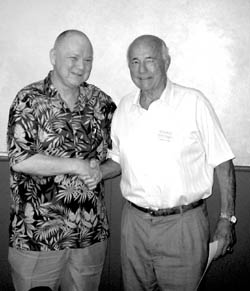
Jim Melby and Verne Gagne. Courtesy the Wrestling Revue archives
I remember a night at the 2002 Cauliflower Alley Club event in Las Vegas. Jim was sitting at the bar with a lady friend, holding her hand and enjoying a quiet moment. All of a sudden, out of nowhere, a guy befitting the old saying about the first row of a wrestling crowd having 32 teeth and an IQ of 50, came running up and parked himself exactly six inches away from Jim and began to ask him questions about Ray Stevens versus Bill Miller at the Cow Palace, in 1960-something. Despite the interruption, Jim treated the fan with respect, answered his questions, and never broke kayfabe. This particular fan was a true believer, and he walked away from his meeting with Jim feeling satisfied, savoring his moment. I asked Jim how he’d kept his cool with the guy. “Well, he probably bought a lot of magazines over the years, Bill. It’s no trouble to answer a few of his questions. Besides, the way he approached me reminded me of you when we first met. We’re all just wrestling fans at heart.” Did I mention Jim sometimes had a smart-aleck sense of humor? But it was a point well taken, and it was damn funny, too.
Jim went through a lot medically and personally in recent years, and had been telling us he felt like his body was giving out. But he kept on going, working everyday, and making the people around him feel better. In his capacity as the court representative for the entire Ramsey County Probation Department, he showed up every day, totally professional, and totally prepared. Judges raved about his job performance, which came as no surprise. Every job that Jim ever had, he excelled at, and did so with humility. He always had a good word for everyone, and was without a doubt the most positive person I’ve ever known.
Even though I knew how ill Jim had been, I am still shocked at the news of his death. He just always seemed to have that something extra, deep down inside, that all champions are known for, and it always looked like he was going to make a big comeback.
The dignity with which he handled life’s hurdles and how he treated others is something I’ll never forget. As I reflect on Jim, I’ll always think about what he used to say: “Remember, if you are looking up at the ring lights, it is time to kick out!” Being Jim’s friend changed me for the better, and I feel honored to have known him.
So long, Jim.
RELATED LINK
